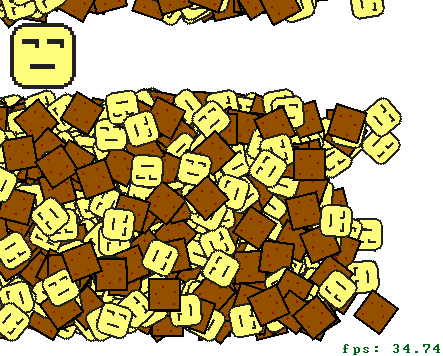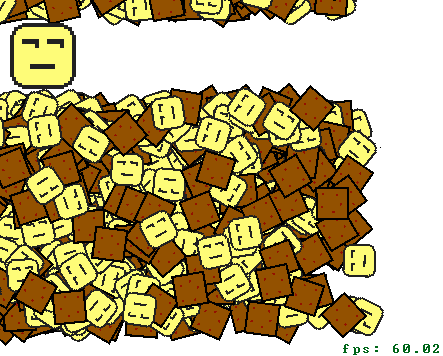cgame: 11-line optimization
I've continued to work on cgame since the independent work deadline. Most interesting updates:
- Backwards-compatible save for C systems: This is more of an internal thing, but basically this means changing the format of C save/load data (by, for example, adding or removing properties) will not make old save files unusable.
- Animation system: Here's a video if it in use.
The focus of this blog post, however, is on a small change
I made to the code that brought a big performance bonus. C functions
of the form x_y are available as cs.x.y in Lua. This allows
writing cs.transform.rotate(...) for transform_rotate(...), which
is the same as if transform was actually a Lua system. So Lua scripts
see a consistent API for both Lua and C systems. This was made
possible by the following Lua code:
local systems_mt = {
__index = function (t, k)
local v = rawget(t, k)
if v == nil then
local mt = {
__index = function (_, k2)
return cg[k .. '_' .. k2]
end,
}
return setmetatable({}, mt)
end
return v
end,
}
cg.systems = setmetatable({}, systems_mt)
cs = cg.systems
So the metatable of cs makes it so that accessing a non-existent
member gives a table that concatenates the keys and returns the C
symbol. While reviewing the code today I realized this internal table
was being re-created every access, so I added some memoization:
local system_binds = {}
local systems_mt = {
__index = function (t, k)
local v = rawget(t, k)
if v == nil then
local bind = system_binds[k]
if bind == nil then
bind = setmetatable({}, {
__index = function (_, k2)
return cg[k .. '_' .. k2]
end,
})
system_binds[k] = bind
end
return bind
end
return v
end,
}
cg.systems = setmetatable({}, systems_mt)
cs = cg.systems
The results? Here's a screenshot of the FPS counter when running
test_huge.lua with 2000 blocks before the change:
And here it is after:
Yup, it actually maxed out the FPS (which is capped at about 60).

